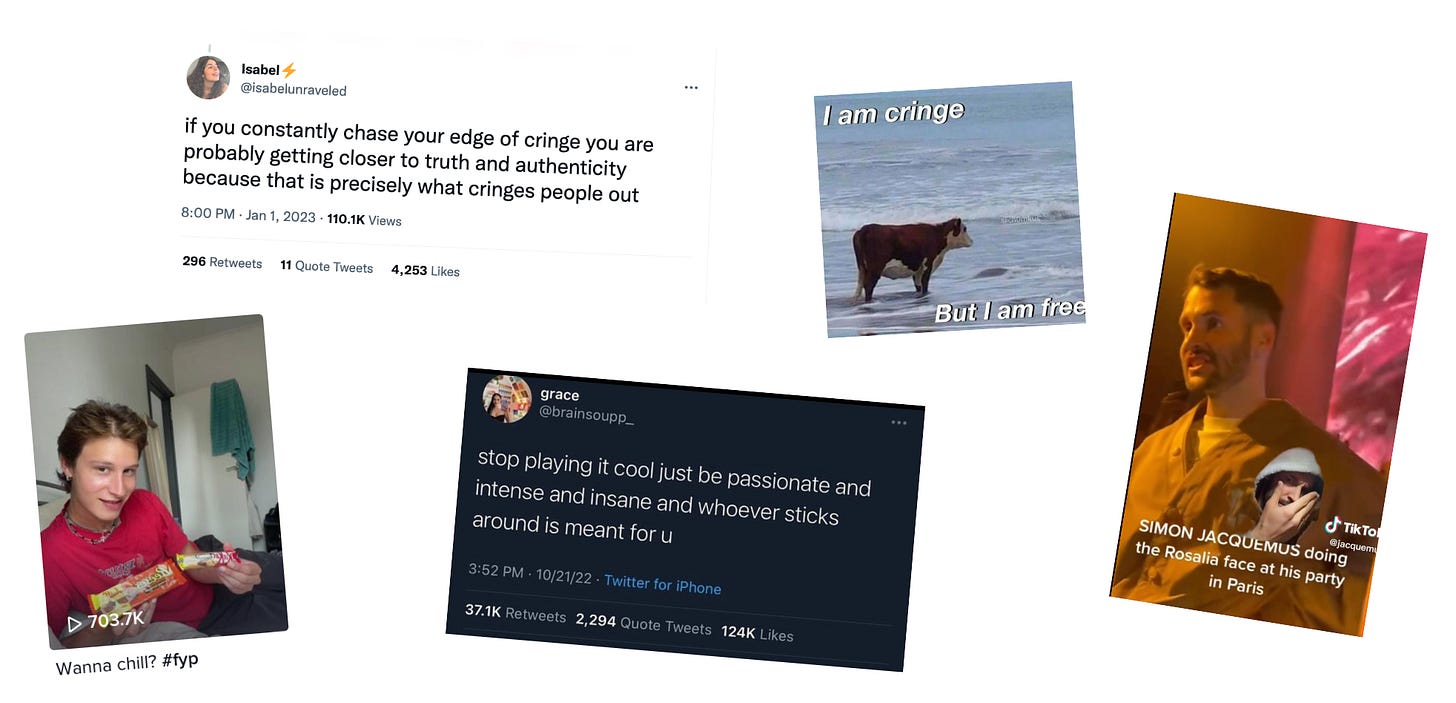Extended Response #2: Post-Cringe and Cringe Posts
Last year, Hannah Nathanson of Elle U.K. asked me why cringe content grew in popularity (not that I'd know from personal experience). Here's what I replied and some extra thoughts on cringe.
Read Hannah’s Elle UK Article “OMG SO CRINGE” she interviewed me for here
Q: Why do you think cringeworthy content travels so well and so fast on the internet?
The content is social faux pas and similar to the “what are your icks?” conversation, it opens a dialogue around personal social cues. Well, “a dialogue around personal social cues” is a polite way to put it, more trolly comments and DMs on how unbelievably cringe the content is.
"Cringe" is a relatable conversation piece, “Oh my god, how could another human act like that”. Anything on the internet that is relatable, especially if it causes a reaction or opinion since that equates to users commenting and DMing.
(Quoted in Hannah’s Article here)
Q: What have been the cringiest internet moments recently in your opinion?
#Cringetok was all the rage last year. The content is usually of tween boys inventing modern “star-crossed lovers” scenarios and then performing them to the camera with a pout, a fit and perfectly quaffed hair to make fellow tweens swoon. #Cringe, but tweens love it.
#Cringechallanges were for the self-aware TikTokers. Users would do a series of known cringy social acts (i.e. dabbing) and sayings (i.e. whiny “pick me” phrases) with the challenge being to not cringe themselves out by them - but, as you can see it’s hard not to go 😬
 Tiktok failed to load.
Tiktok failed to load.Enable 3rd party cookies or use another browser
Naturally, the irony-loving Gen Z also use cringe for just that - irony. Think how novelty items, slogan tees and trucker hats are in their wardrobe. These cringy items signal that they believe “nothing is that serious” and that they're too cool to care.
Moreover, being a bit cringe is natural.
Gen Z is starting to purposefully employ cringe to show they are "real", free, self-aware and/or cool. I see cringe as the next big method for seeming “relatable” online, following on the coattails of what “plurry” images have been messaging for a year now.
The naturalness of cringe has also allowed rawer expression. I go into detail about this on MØRNING’s substack, but embracing cringe has helped us break the shackles archetype influencers have put on us. We can’t be cool all the time and it’s more important to truly express yourself - Jacquemus knows.
Q Even Giphy admitted Gifs were now cringe – what’s your opinion on this?
When the piece about this came out, I sent it to my colleague saying “do you ever see me use gifs? No.” I find them cringe, but it is not the content, it's that they're a millennial trope and thus cause an intergenerational ick when sent to someone younger.
What gifs are to millennials, quoting TikTok is to Gen Z. When a Millennial sends a gif to a Gen Z, it’s outdated and cringe. When Gen Z quotes TikTok to a Millennial, it's confusing, so no cringe.
Gifs are usually a relatable clip from 80s, 90s or 00s TV/Films, right? So using them shows the era you grew up in as they commonly use millennial material.
If I am really deeping it, some people use gifs to give them more of a personality. Similarly to what bleached hair can do to a very average boy on Hinge, gifs provide a layer of vibe or humour the sender does not naturally have - so they reference/gif for it. Which is kinda unreal and cringe.
Q How does cringe content (what makes us cringe/what doesn’t) differ depending on different generations?
Communications tropes and social cues stick to a generation. They represent a time and a set of people. Sharing these downstream in sequential generations (millennial to Gen Z) gives an ick as it feels “outdated”.
However, cringe dissipates when there are several decades between two generational cohorts as the tropes are from another time and almost without context making way for admiration of what was and not so much cringe.
End of Questions!
That’s enough from me, time to take your finger or cursor here to Hannah Nathanson’s article where she goes beyond online spaces to address why UK politics was (and is) so cringe and why everyone’s physical response to cringes is unique.
A huge thank you to Hannah for including me, it was super fun to see my name in print :)
What do y’all think?
What makes you cringe?
Do you think we’ve rinsed cringe of all the social media virality it can have? (My most recent and underperforming Instagram post would suggest so.)
As we move post-cringe, are we on to an era of unfiltered online expression?
till the next time i start typing…
lol, emily chapps :)








